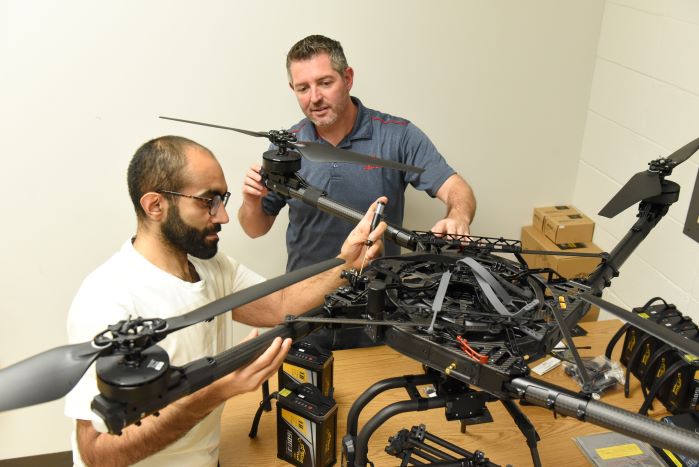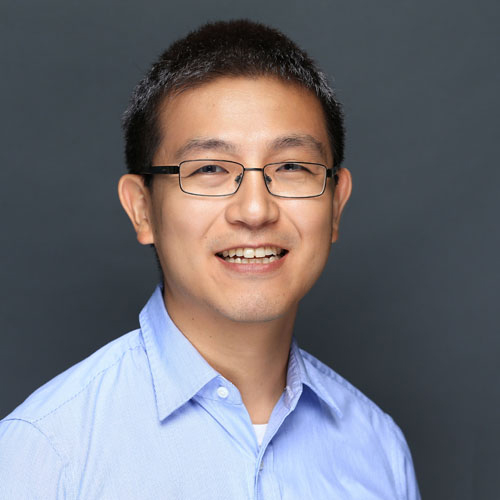Department of Electrical and Computer Engineering Research
Research
Our faculty are comprehensive engineers and researchers who strengthen our community by combining invention and innovation to find innovative solutions to global challenges.


Department Research Centers and Labs
Director: Amy Neidhard-Doll
The Biomedical Engineering & Additive Mechatronics (BEAM) Laboratory is dedicated to research in biomedical engineering, medical imaging/healthcare electronics and additive manufacturing techniques for medicine and 3D printed electronics. The lab features a variety of bioinstrumentation and equipment utilized for patient diagnostics in healthcare, including a telehealth virtual patient care platform received from Premier Health Network for collaborative clinical telemetry research. The lab also features a Fusion3 F410 Fused Deposition Modeling (FDM) 3D Printer, a FormLabs Form2 stereolithography (SLA) 3D Printer, benchtop test and measurement electronics, Bantam Tools Othermill Pro PCB milling machine, desktop computers, and associated computer software for circuit design/analysis, medical imaging and 3D CAD design. In addition, the BEAM Lab has access to both commercial grade EOS M290 selective laser melting (SLM) and open architecture SLM metal 3D printers through collaborative research efforts with the University of Dayton Research Institute (UDRI).
Areas of Research
- Computer vision, pattern recognition and machine learning
- Digital signal and image processing, biomedical imaging and sensors
- Embedded data processing
- Nonlinear optics, metamaterials and holography
- Acousto-optics and wave propagation
- Control systems and robotics
- Nano-fabrication and optoelectronics, device technology
- Micro- to nano-scale electronics, fabrication, integration and packaging
- Ferroelectric varactor devices
- High performance neuromorphic computing
Faculty Research and Expertise
Dr. Asari is a professor in electrical and computer engineering and the Ohio Research Scholars Endowed Chair in Wide Area Surveillance at the University of Dayton. He is the director of the Vision Lab (Center of Excellence for Computational Intelligence and Machine Vision) at UD. Dr. Asari holds five patents and has published more than 700 research papers, including 136 peer-reviewed journal papers in the areas of image processing, computer vision, pattern recognition, machine learning and artificial neural systems, co-authoring with his graduate students and research collaborators. Dr. Asari received several awards for teaching, research, advising and technical leadership. He is a Fellow of SPIE and a Senior Member of IEEE.
Dr. Asari's research focuses in the development of algorithms and architectures for automatic object detection, recognition and tracking in wide area surveillance imagery captured by visible, infrared, thermal, multi-spectral, hyperspectral, and LiDAR (light detection and ranging) sensors. His research activities include 3D scene creation from 2D video streams, 3D scene change detection, automatic visibility improvement of images captured in various weather conditions (low lighting, haze/fog, and rain), human identification by face recognition, human action and activity recognition and human expression analysis. His research team also develops deep learning-based autonomous systems for digital pathology image analysis for abnormal region segmentation by accurate abnormality detection and classification and prediction of abnormalities for diagnostic purposes. Dr. Asari is actively involved in brain signal analysis for emotion recognition and brain machine interface using EEG (electroencephalograph) data.
Learn more about Dr. Asari's research
Eric Balster graduated Magna Cum Laude from the University of Dayton in 1998 with a B.S. and in 2000 with an M.S., both in electrical engineering. He received his Ph.D. in electrical engineering from Ohio State University in 2004. His research area was in the field of image and video processing, specifically in compression and preprocessing algorithm development. From 2002 to 2006, he worked in the Information Directorate, Air Force Research Laboratory (AFRL), continuing his work in image and video processing research. From 2006 to 2008, he worked in the Sensor’s Directorate at AFRL, where he was the lead aircraft software development, support and flight test engineer for a prototype wide-area persistent surveillance system. In 2008, he started as an assistant professor in the Department of Electrical and Computer Engineering at the University of Dayton. Since 2020, Dr. Balster has worked as a professor at the University of Dayton, where he continues research in embedded image processing and aerial surveillance processing systems.
Learn more about Dr. Balster's research
Dr. Cao's primary focus is to develop efficient electric power conversion and management solutions for future clean energy needs. His research group specializes in the renewable energy sources (photovoltaic/solar panels) grid integration, electric vehicles electric drive, on-board charging, superfast charging, wireless charging, hydrogen/ammonia fuel cell power management for hybrid electric aircraft, electric vertical take-off and landing aircrafts and efficient data center power deliveries. Recent projects include data-center power supply funded by Google and the National Science Foundation, highway/snow fence solar panel integration funded through the Department of Transportation, electric motor drive and fuel cell power management for electric aircraft funded by the U.S. Air Force and the Ohio Federal Research Network, megawatt level (MW) power train development for future clean electric aircraft funded by NASA.
Learn more about Dr. Cao's research
Dr. Rigling received a B.S. degree in physics-computer science from the University of Dayton in 1998 and received M.S. and Ph.D. degrees in electrical engineering from The Ohio State University in 2000 and 2003, respectively. From 2000 to 2004, he was a radar systems engineer for Northrop Grumman Electronic Systems in Baltimore, Maryland. In 2022, Prof. Rigling accepted an appointment in the department of electrical and computer Engineering at the University of Dayton as a professor and Ohio Research Scholar for Sensor Exploitation and Fusion. In 2007, Prof. Rigling authored the chapter on Bistatic Synthetic Aperture Radar for the book Advances in Bistatic Radar, edited by Nicholas Willis and Hugh Griffiths. Prof. Rigling served on the IEEE Radar Systems Panel from 2009-2018 and 2023-present, was an associate editor for IEEE Transactions on Image Processing 2009-2013 and currently serves as an associate editor for IEEE Transactions on Radar Systems. He was the general chair for the 2014 IEEE Radar Conference, was awarded the 2015 IEEE Fred Nathanson Memorial Radar Award and was elevated to IEEE Fellow in 2018. Prof. Rigling’s research broadly encompasses sensor signal and image processing with emphasis on radar and in particular, bistatic and synthetic aperture radar. His past research projects and publications include a variety of other sensor modalities and topics as diverse as remote sensing of small UAVs and forecasting of natural time series.
Learn more about Dr. Rigling's research
Experience! the ATR Center Summer Program, a collaborative research experience to answer Air Force sensing and autonomy technologies, sensor processing and exploitation, object detection, tracking and recognition, navigation, geolocation, malware detection and defense issues. View the ATRC Summer Program page for more information. For any questions, please contact Brian Rigling, director, ATR Center.



